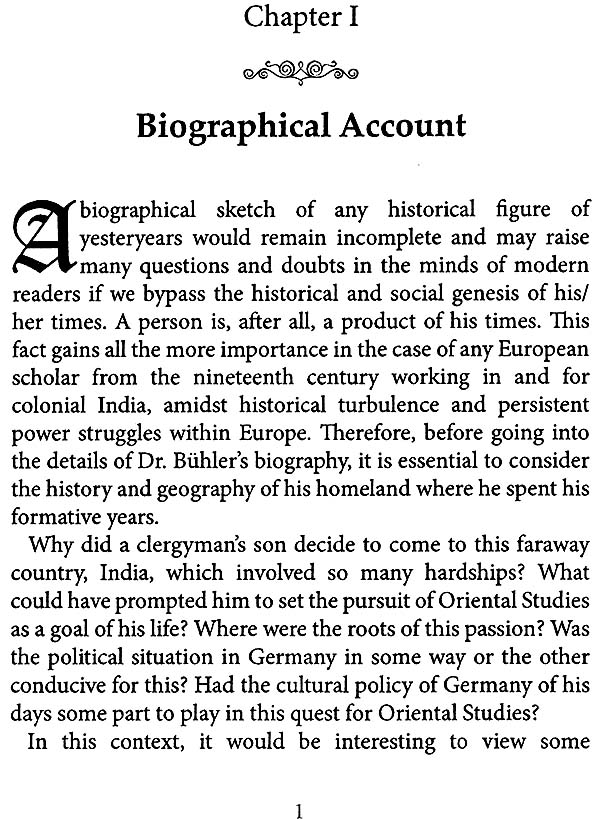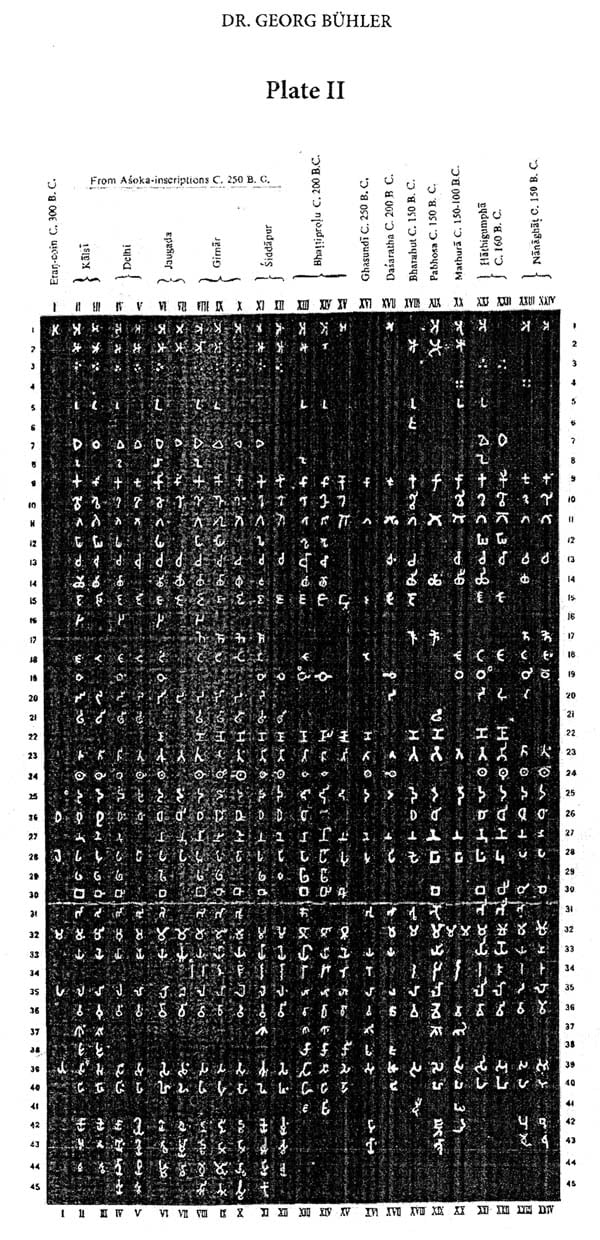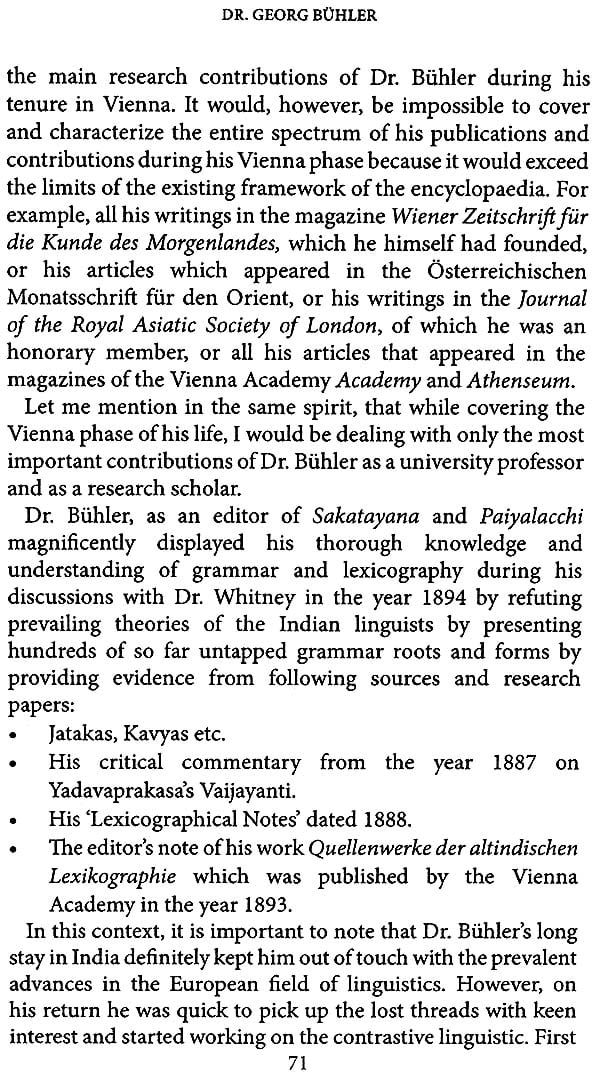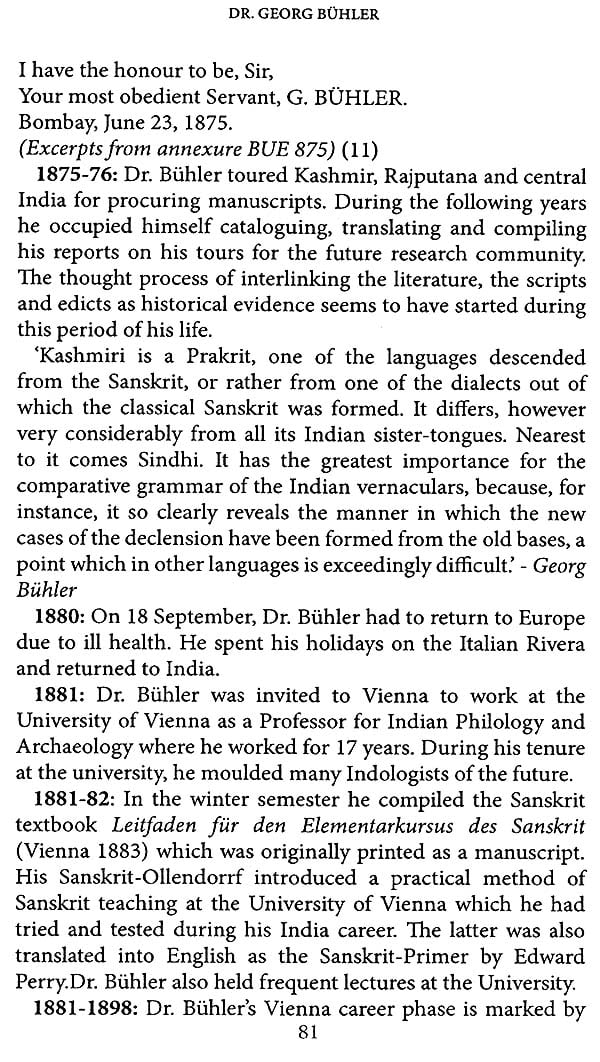
Dr. Georg Buhler (Founders and Guardians of The Asiatic Society of Mumbai)
Book Specification
| Item Code: | NAP410 |
| Author: | Vaishali Karmarkar |
| Publisher: | Indus Source Books |
| Language: | English |
| ISBN: | 9788188569854 |
| Pages: | 112 |
| Cover: | Paperback |
| Other Details | 8.5 inch X 5.5 inch |
| Weight | 160 gm |
Book Description
I buy MSS wherever I am able to put my hand on them, which is not at all easy. The Brahmins do not want to part with them and hand them over to people from another faith. Only some deceitful agents are able to trick them into selling. I have been really lucky in my speculations and could thus collect some really precious MSS.' (Excerpt from Dr. Bihler's letter Nr.5 Apri11863)
Within the scholarly world of nineteenth-century Europe, the identity of the Indologist, Dr. Georg Baler (1837-1898), remained unfortunately restricted to this single facet, namely, 'a mere trader of Sanskrit MSS'. This monograph attempts to give the readers a much deeper understanding of Dr. Bihler' s scholastic contributions to the Indian Antiquity. Not many in India are aware that the rich and diverse scripts of Indian regional languages were not forcibly converted in the Roman script—which happened in case of other Far Eastern colonies of the British Raj—and were allowed to survive and thrive because a pragmatic group of Indologists of the nineteenth century, Dr. Biihler being one of the most towering figures amongst them, stood vehemently against this destruction. It is therefore no wonder that his monumental work and repute as an epigrapher and palaeographer earned him a place in the first fifty individuals appointed to the 'Order of the Indian Empire' in 1878.
Dr. Biihler was in many ways a focal point for Indological scholarship in German Europe, opening doors for the expansion of active Indological studies in German universities.
Vaishali Karmarkar is a German language expert and Intercultural Facilitator, and is a faculty member of the Goethe-Institut/Max Mueller Bhavan, Mumbai.
Vaishali Karmarkar is an Intercultural Facilitator and head of Marketing for Corporate Training at the Goethe-Institut/Max Mueller Bhavan, Mumbai. After completing her graduation in Mumbai she pursued German Studies in Munich and worked in Germany on various projects. Her current job is to facilitate intercultural communication between German and Indian companies.
She has founded a course 'Introduction to the Translation Techniques for language pair German - English' in cooperation with FTSK Germersheim, University of Mainz, Germany. She has been also awarded the Casa Asia scholarship for conducting lectures on 'Translation Studies in India and on the 'Knowledge Tradition in India at the University Ramon Llull, Barcelona, Spain. As an active member of SIETAR Germany, she has published many papers in German language on intercultural topics and has developed independent training modules in German and English.
Vaishali Karmarkar has written two books in Marathi, Sanskrutiranga (2011) and Culture Shock Germany (2015). She is also the editor of the series 'Culture shock' and writes occasionally for the Marathi press.
One of the aims and objectives of the Asiatic Society as envisaged when it was set up in 1804 was 'to Ser promote useful knowledge particularly such as is now immediately connected with India'. This network of Act institutions was created on the initiatives of the representatives of the British rulers to generate, systematize and disseminate enc knowledge of the Oriental countries. It is not surprising, therefore, that the contributions, particularly of the nineteenth sup -century European scholars who worked under the auspices of the Asiatic Society, have ever since carried a question fro, mark in the minds of modern Indian scholars on the motive the behind such British initiatives which encouraged an enquiry he into Indian Antiquity. It is nearly seven decades since the sun rest set on the British Empire in India. The dust that the uneasy Indo -British relations had spread is almost settled and we can of f now see things in their proper perspective. If we study the lives con and the seminal contributions of the British to various fields of pro scholarship it will be difficult to deny them a place of reverence mo in our hearts. We have benefitted from the contributions and to earnest and conscientious efforts of at least some of these ma] scholars. But they have remained, for obvious reasons, unsung and unwept in India, sometimes in Europe, and at times even in the world of British scholarship.
The present monograph, dedicated to highlight the scholarly contribution of German scholar of Indology, Dr. Georg Bihler (1837-1898), covers the second evolutionary phase of the Asiatic Society when it was known as The Bombay Branch of the Royal Asiatic Society of Great Britain & Ireland (BBRAS in short), encompassing the time frame from 1829 to 1947. A study of the life and achievements of Dr. Baler demands special care. He was not an independent researcher or an academician, pursuing his own research goals. In fact, he was one of the entire group of German researchers from all fields of Natural Sciences and Humanities who were supporting the British administration of the nineteenth century to run this huge colony of the Indian subcontinent. Prof. Kris Manjapra in his recent research gives us a collective view of the entire German involvement of those years under the title 'German Servants of the British Raj' in his recently published historical studies Age of Entanglement: German and Indian Intellectuals across Empire.
German academicians of the nineteenth century were encouraged to acquire oriental knowledge by the then Prussian rulers of Germany. The academic world of Germany supported every such initiative, especially the studies on Indology. Dr. Biihler had to thus carefully manage both fronts, the British administrators whom he was serving and the German academic world where his future lay and where he was ultimately hoping to take forward his independent research work. It was not an easy task.
Writing a monograph on Dr. Bailer necessitated a process of following various foot-prints in two languages in which he compiled his research. His German origin, his presence as a professor at an eminent college in Bombay (now Mumbai) for more than a decade and his scholarly pursuits from Philology to Palaeography, from Ancient Hindu Law to Archaeology make an enquiry into his life and work all the more interesting. The monograph is divided into four sections. The first section will take the readers through the biography of Dr. Baler with a brief background of the social and political scene of Germany during his days and Germany's position within Europe. The second section will cover his Indian career, especially his contribution to the Asiatic Society. In the third section we will take a closer look at his research path after he left India and thus became free to follow his own path in Vienna. The fourth section will try to put the scholarly contributions of Dr. Baler on a larger canvas of post-colonial India and try to draw some conclusions with regard to the strategic importance of 'Studies of Foreign Language and Culture' as an instrument of soft-power.
The last part of the monograph contains a Bibliography and two Appendices.
The first Appendix contains a complete translation of the original German text from the year 1898 written by Julius Jolly, a close follower of Dr. Biihler and included in the Encyclopaedia of Indo-Aryan Philology and Antiquity, Volume 1, Book A. (Grundriss der Indo-Arischen Philologie and Altertumskunde, I. Band, 1. Heft, A)
I am very happy to note that this is the first ever German to English translation of this part of the Encyclopaedia to be published for the benefit of English-speaking researchers. The second Appendix sketches a complete chronology of his life focussing on important people who shaped his passion for oriental studies.
I am happy to be assigned to write this monograph by Dr. Aroon Tikekar, renowned journalist and historian, and former President of the Society who has been investigating the British and the European scholarship in the erstwhile Bombay Presidency during the nineteenth and early twentieth centuries for the past few decades. It is Dr. Tikekar who conceived this series of monographs. His scholarly guidance, selecting and reorganizing primary and secondary source material was of immense help to me. I wish to thank him profusely. A firm hand of a mentor makes the arduous journey in the caves of the past a real joy.
| A Note from the General Editor | vi | |
| Introduction | viii | |
| 1 | Biographical Account | 1 |
| 2 | Indian Career and Contribution to the Asiatic Society | 7 |
| 3 | Contribution to Indological Studies During Vienna Phase | 24 |
| 4 | Conclusion | 41 |
| Appendix - I | 50 | |
| Appendix - II | 78 | |
| Notes | 91 | |
| Bibliography | 104 |









